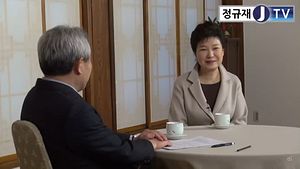For the first time, South Korean President Park Geun-hye spoke one-on-one with a journalist from the domestic media. It took nearly four years and an impeachment.
Park took questions for an hour from Jeong Kyu-jae on his video podcast “Jeong Kyu-jae TV.” Jeong is the chief editorial writer of the conservative Korea Economic Daily, and his interview with the president already has more than 1.3 million views.
The presidential office said the interview, released Wednesday, was “informal, unofficial” and arranged by Park in her own capacity, seemingly through close counsel.
The rare meeting (Park has spoken to foreign press one-on-one several times) may be the exclamation point of her aversion to speaking with journalists while president. Her term, with its fate now being decided by the Constitutional Court, could be drawing to a close shortly.
Park spent most of the interview again professing her innocence over allegations she abused the constitution by colluding with her friend Choi Soon-sil to extort major corporations for personal gain.
Park called the allegations “preposterous, colossal lies,” and said her only mistake was being unaware that Choi was acting behind the scenes, which led to the ensuing public uproar.
“If [I] track down [the string of the allegations], I cannot help but think that [the scandal] was premeditated, to be candid with you,” said Park, according to Yonhap News.
Han Jeoung-hun, a professor of political science at Seoul National University, said it’s likely Park chose to give her first exclusive interview ahead of the Lunar New Year holiday to find favor with traditional support bases.
“I agree with the argument [among analysts and media] that President Park wanted to send a message about her cruel and miserable situation to elderly people who have memories of her father [former President Park Chung-hee],” said Han.
“Park may be hoping those people will persuade their families [to side with the president] when they gather for the holiday this weekend.”
Han also said Park likely reached out to Jeong for her first local exclusive because the journalist supports her and she could expect softball questions she’d prepared for.
That way, Han said, no “abrupt” questions would pop up, something Park has quite obviously tried to avoid during her term.
After her third public apology late last year to the nation over the scandal, Park read prepared remarks and quickly left the stage. The Korea Times followed up with an article called, “The President who never takes questions.”
Unsurprisingly, Park is getting hammered again in the local media.
Choung Byoung-gug, the chairman of the newly formed Bareun Party, told the left-leaning Hankyoreh newspaper that Park’s claim she was set up “confuses and divides Korean citizens.”
“She had enough opportunities to speak for herself at the Constitutional Court and to the special investigation team, but she chose not to,” said Choung.
Despite the negative press and widespread public contempt, the president is not on an island.
Rhee In-je, a lawmaker of Park’s ruling Saenuri Party, advocated for the president on Twitter, as reported by the conservative Dong-A Ilbo newspaper.
“In the storm built by the media, the truth can’t breathe,” said Rhee, who recently announced he’s running for president as Saenuri’s candidate.
A group of Park’s supporters, known as Parksamo, still gather by the dozens and sometimes hundreds around Seoul to proclaim the president’s innocence.
This week, Kim Kyu-sam, 74, said outside Seoul City Hall that the media and prosecutors are driving Park into a corner without evidence, although she sacrificed herself for the nation.
Another Parksamo supporter, 44-year-old Cheong Ham-cheol, said Park’s mistakes, namely Choi Soon-sil’s meddling, aren’t grave enough for the president’s early dismissal. He also blamed the media: “They say Park doesn’t apologize and still tells lies. The media is inciting and deceiving the citizens.”
South Korea’s Constitutional Court will ultimately decide the weight of the evidence against Park and whether she’ll finish her term. The court’s chief justice has said a decision must be reached no later than March 13.
































